Experts from China and the US discuss sustainable development of the Arctic region and China-US cooperation
From May 29 to 30, the Fifth China-US Arctic Social Science Conference, jointly organized by the Institute of International and Public Affairs of Tongji University and South China Business College (SCBC), was held online and offline at South China Business College. Experts and scholars from China and the United States gave keynote speeches and had lively and in-depth discussions on issues related to the Arctic situation and China-US relations, such as sustainable development of the Arctic region and China-US cooperation, review and outlook of China-US Arctic cooperation, and the latest developments of the Arctic situation.
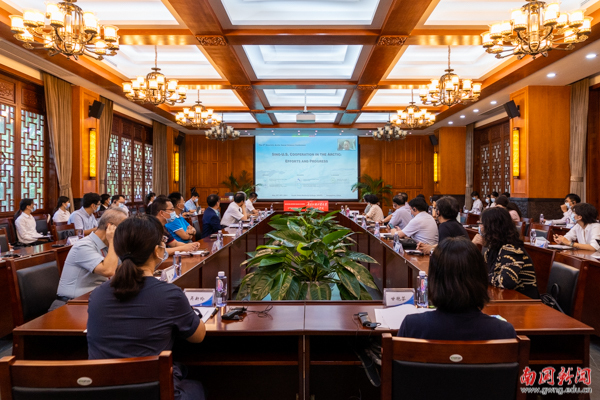
Offline conference
Together with researchers from SCBC’s Center of Polar Issues Studies, more than 100 experts who attended the conference came from government agencies, scientific research institutions and universities, including the Ministry of Foreign Affairs of China, Chinese Academy of Social Sciences, Polar Research Institute of China, Polar Research Institute of Hong Kong, Shanghai Institutes for International Studies, Tongji University, Shanghai Ocean University, Shanghai Jiao Tong University, Nankai University, Guangdong University of Foreign Studies, Hainan University, Dalian Maritime University, University of Macau, as well as experts from the Wilson Center in Washington DC, Henry L. Stimson Center in Washington DC, Woodrow Wilson Center Polar Research Institute, the Institute of the North in Anchorage Alaska, the International Center for the Law of the Sea and Dispute Settlement, and the Center on International Maritime Conventions Studies.
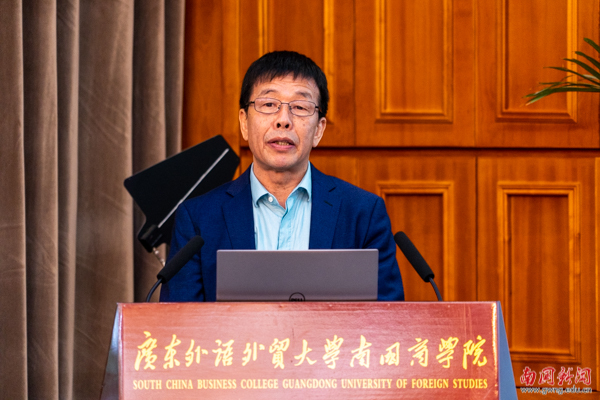
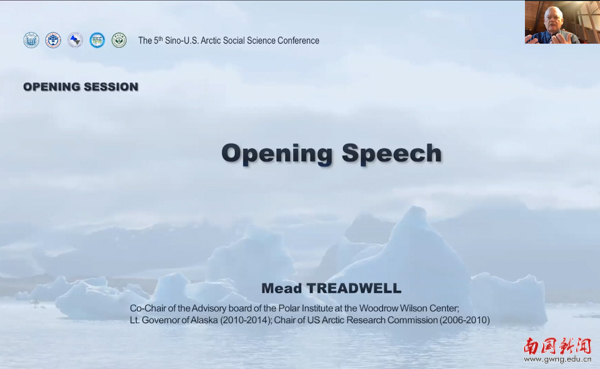
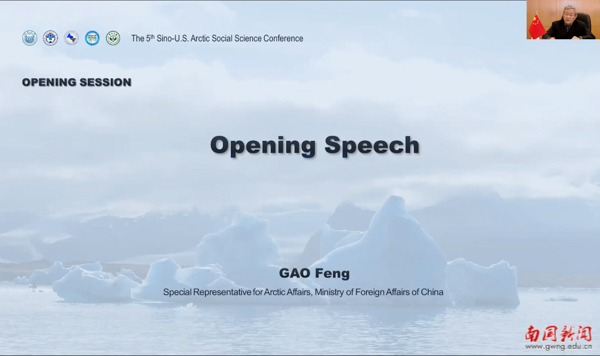
Opening speeches given by Wang Hua, executive president of SCBC, Mead Treadwell, co-chair of the Advisory board of the Polar Institute at the Woodrow Wilson Center, and Gao Feng, special representative for Arctic Affairs, Ministry of Foreign Affairs of China.
Xia Liping, dean of Institute of International and Public Affairs and director of the Center for Polar and Oceanic Studies atTongji University, hosted the opening ceremony. Wang Hua, executive president of SCBC, Mead Treadwell, co-Cchair of the Advisory board of the Polar Institute at the Woodrow Wilson Center, and Gao Feng, special representative for Arctic Affairs of the Ministry of Foreign Affairs of China, addressed the audience respectively.
“With climate change and environmental degradation, Arctic affairs have received widespread attention from the international community,” said Wang Hua. “Polar research institutions and universities in China and the United States play an important role in promoting sustainable development of the Arctic and cooperation between China and the United States.” He pointed out the importance of holding such a conference, an occasion for many experts and scholars engaged in polar studies from China and the United States to gather together and discuss issues related to China-US cooperation in the Arctic. He expected all the researchers of the Center of Polar Issues Studies of SCBC to take this opportunity to learn about the forefront of polar studies, focalize their research direction, optimize the research team, make more achievements by persistent research, and better serve China and the world. He also hoped that experts from China and the US can gain a deeper understanding of each other's research processes, and lay a solid foundation for both countries to seek further cooperation.
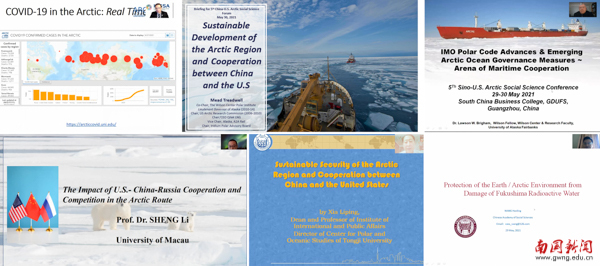
Experts shared their academic results in the conference.
At the meeting, 28 experts and scholars from China and the United States gave keynote speeches. Lawson Brigham, global fellow at the Wilson Center in Washington DC and distinguished fellow at the University of Alaska Fairbanks, shared his academic views on the topic of “IMO Arctic Ocean Ship Navigation Safety Rules and Governance”. Xia Liping and Mead Treadwell respectively shared their views on the Arctic's sustainable development and the cooperation between China and the US in the Arctic affairs. Sun Yun, senior fellow and co-director of the East Asia Program and director of the China Program at the Henry L. Stimson Center in Washington DC, introduced and interpreted Biden’s Arctic Policy.
Wang Chuanxing, professor of Department of Diplomacy of School of Political Science and International Relations and research fellow of the Center for Polar and Maritime Studies at Tongji University, also shared his views on the US Arctic strategy under the Biden Administration and Sino-US Arctic cooperation. Wang Hanling, professor of Institute of International Law at the Chinese Academy of Social Sciences, shared his thoughts on the discharge of Japan's radioactive water and the protection of the Arctic environment. Andrey Petrov, president of the International Arctic Social Sciences Association, talked about COVID-19 pandemic and the future of Arctic research cooperation in the Arctic.
Prof. Sheng Li, associate dean of Faculty of Social Sciences at the University of Macau, delivered a speech entitled “Impact of US-China-Russia Cooperation and Competition on the Arctic Route of the Belt-and-Road Initiative: Opportunities and Challenges”. Pan Min, professor and deputy director of the Center for Polar and Ocean International Studies of the School of Political and International Relations at Tongji University, presented his paper Beyond ‘Monroe Doctrine’: the Arctic Science Ministerial and the Innovation of Arctic Governance Regime.
Luo Ying, Liu Lanfeng, Li Yanfei, researcher fellows of SCBC’s Center of Polar Issues Studies, also presented their papers respectively on ”Year-round Normalized Operation of the Arctic Shipping Routes: The Driving Force of Sino-US-Russian Competition and Cooperation in Arctic Strategies”, “ Sustainable Development in the Arctic and the Evolution of the United”, “Current Status of Arctic Scientific and Technological Cooperation and Thoughts on China-US Cooperation”.
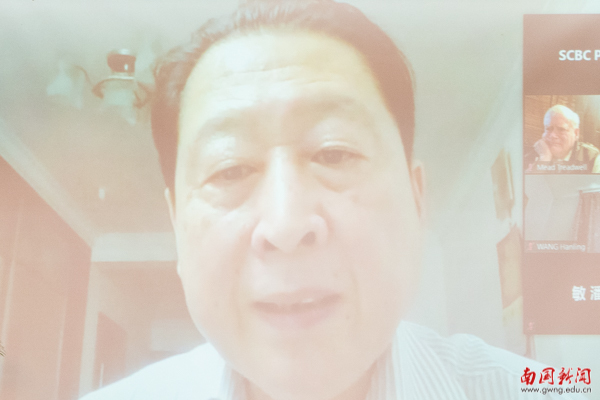
Xia Liping, dean of Institute of International and Public Affairs atTongji University, delivered a closing speech.
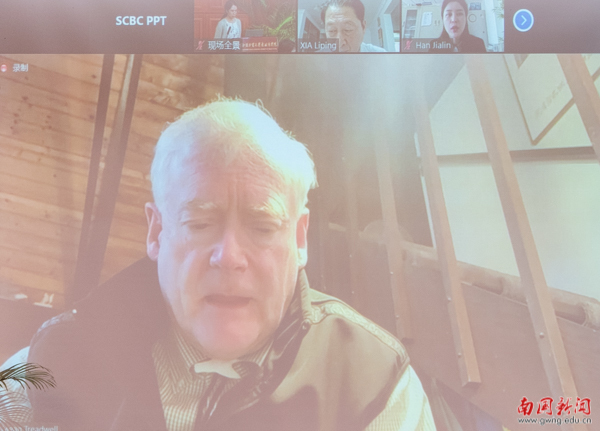
Mead Treadwell, co-chair of the Advisory board of the Polar Institute at the Woodrow Wilson Center, delivered a closing speech.
Xia Liping, dean of Institute of International and Public Affairs at Tongji University, and Mead Treadwell, co-chair of the Advisory board of the Polar Institute at the Woodrow Wilson Center, delivered a closing speech respectively. Xia believed that China and the US share common interests and opportunities for cooperation in many areas in the Arctic region, and that only by strengthening China-US cooperation in the Arctic can we better achieve peace, stability and development in the Arctic region. Treadwell said that this meeting is held at a time when China-US relations are full of uncertainties, but the Arctic region can become an area where China and the US can work together, promote cooperation and build mutual trust, and cooperation and common development is the best way out.
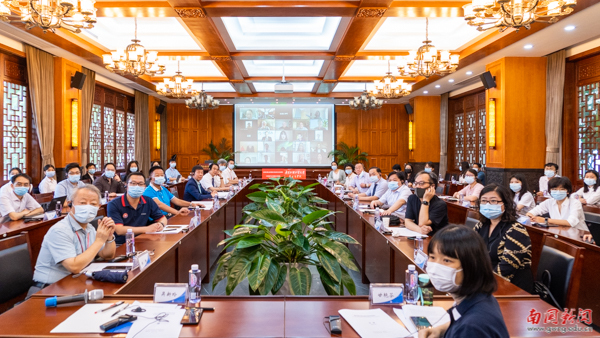
Group Photo
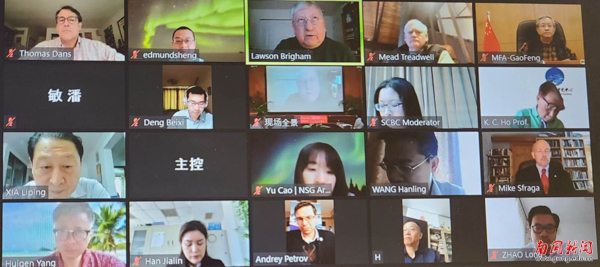
Experts and scholars on Online platform
Founded in 2015, the China-US Arctic Social Science Conference has been working to bridge the intellectual communications between Arctic scholars in China and the US. The Conference has played a particularly useful role in exchanges between Chinese and US scholars on topics such as Arctic governance, geopolitical and security dynamics, economic development, environmental challenges, and scientific cooperation. Its goal is to bring out better understanding of the perspectives and interests of both countries and contribute to the realization of the “Arctic Dream”.
SCBC’s Center of Polar Issues Studies is one of the registered Regional and National Studies approved by the Ministry of Education of China. It was accepted as a member institute of the China-Nordic Arctic Research Center (CNARC) in May, 2018 and joint the Northeast Asia Arctic Shipping Research Alliance in October, 2020. The achievements of the Center in 2020 was rated as “high level” by the Department of International Cooperation and Exchanges of the Ministry of Education.